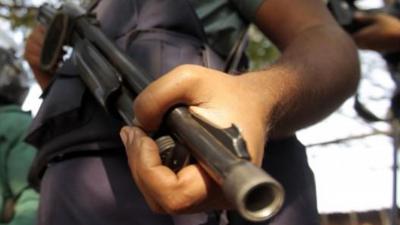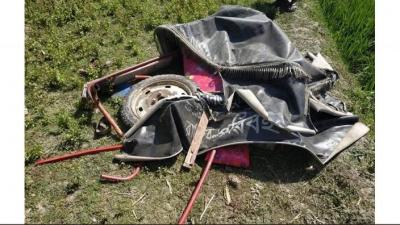 No water supply in the entire building; even the tube well is not in working condition. No supply of medicines, only saline.Absence of a full-time doctor. No separate wards for male and female patients, which leaves them with no other option but to room together. Water leaking through the walls of the building and no doors in the toilets only add up to their sufferings.
No water supply in the entire building; even the tube well is not in working condition. No supply of medicines, only saline.Absence of a full-time doctor. No separate wards for male and female patients, which leaves them with no other option but to room together. Water leaking through the walls of the building and no doors in the toilets only add up to their sufferings.
It may sound bizarre, but this building is in fact a government hospital treating patients with infectious diseases, like diarrhoea, cholera, tetanus, measles and rubella.
Two and a half kilometres away from the main hospital, the Department of Infectious Diseases of Rangpur Medical College Hospital (RPMCH) has turned into a patient’s worst nightmare.
Sadly, it is the only centre in the northern part of the country that specializes in infectious diseases.
The infectious diseases department of RPMCH consists of several buildings. However, most of the buildings have been long occupied by outsiders living there with families. According to them, the hospital authorities have permitted then to stay there. However, they failed to show any documents in this regard.
The entire department, thus, has been confined to only two rooms of 20 feet by 10 feet each. One of the rooms is being used to treat diarrhoea and cholera, while the other one is a common ward for both men and women.
During a visit on Thursday, two ward boys and a nurse were seen on duty, but no doctors.
Aleya Begum, the nurse on duty, said: "It is more of a warehouse than a hospital. There is no arrangement for water supply, even the lone tube well has been out of order for a long time. One has to go a long way for water. There are two latrines with broken doors and no water supply."
"There are 12 beds for diarrhoea patients, but with such shortage of space, it can barely accommodate 10," she added.
Salam, a ward boy, said: "Patients with contagious diseases like tetanus, diphtheria and measles are supposed to be kept in complete isolation from diarrhoea patients. Instead, due to lack of adequate space, they are all kept in the same place together." "The sufferings of the patients beggar description when water leaks from the ceiling even if it drizzles. The tiles are broken in many places, the polyester coverings of the walls are coming off, but the authorities are not bothered about that. Despite informing the hospital management multiple times, no action has yet been taken," Salam added.
"The sufferings of the patients beggar description when water leaks from the ceiling even if it drizzles. The tiles are broken in many places, the polyester coverings of the walls are coming off, but the authorities are not bothered about that. Despite informing the hospital management multiple times, no action has yet been taken," Salam added.
Ali, a diarrhoea patient referred here from Panchagarh hospital, said: “When I went to the emergency department of RPMCH, they gave me a ticket and sent me here."
Mentioning that he was admitted at midnight, he said: "A doctor came in the morning. It's almost noon, no doctor has come yet. However, the nurses have been continuously taking care of me."
Morjina Begum from Nilphamari narrated a similar story. Her father was suffering from diarrhoea and has been receiving treatment there for three days.
Admitting that he is aware of the department's poor condition, Dr Sultan Ahmed, the acting director of RPMCH, said: "As the department is away from the (main) hospital premises, we fail to monitor it on a regular basis."
However, Dr Ahmed informed that a 10-story building for RPMCH is under construction and as soon as it is completed, the authorities plan to relocate the Department of Infectious Diseases within the hospital premises.
 Country
Country
41072 hour(s) 35 minute(s) ago ;
Morning 03:29 ; Tuesday ; Jun 24, 2025
Rangpur Medical College Hospital: Patient’s worst nightmare
Send
Liakat Ali Badal, Rangpur
Published : 04:00, May 19, 2019 | Updated : 04:00, May 19, 2019
Published : 04:00, May 19, 2019 | Updated : 04:00, May 19, 2019
0 ...0 ...
/pdn/
Topics: Top Stories
- KOICA donates medical supplies to BSMMU
- 5 more flights to take back British nationals to London
- Covid19: Rajarbagh, Mohammadpur worst affected
- Momen joins UN solidarity song over COVID-19 combat
- Covid-19: OIC to hold special meeting
- WFP begins food distribution in Cox’s Bazar
- WFP begins food distribution in Cox’s Bazar
- 290 return home to Australia
- Third charter flight for US citizens to return home
- Dhaka proposes to postpone D8 Summit
Unauthorized use of news, image, information, etc published by Bangla Tribune is punishable by copyright law. Appropriate legal steps will be taken by the management against any person or body that infringes those laws.
Bangla Tribune is one of the most revered online newspapers in Bangladesh, due to its reputation of neutral coverage and incisive analysis.
F R Tower, 8/C Panthapath, Shukrabad, Dhaka-1207 | Phone: 58151324; 58151326, Fax: 58151329 | Mob: 01730794527, 01730794528






